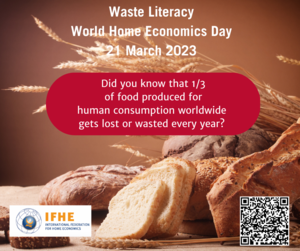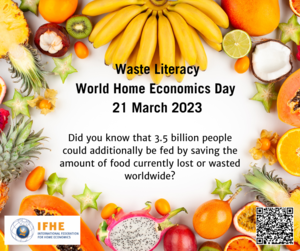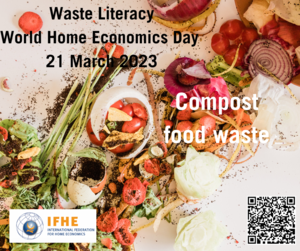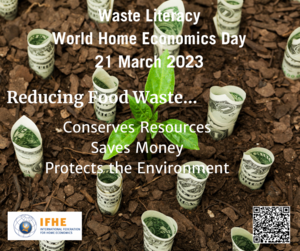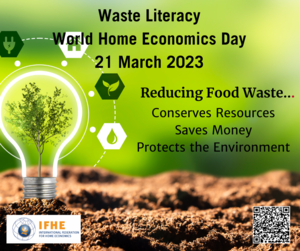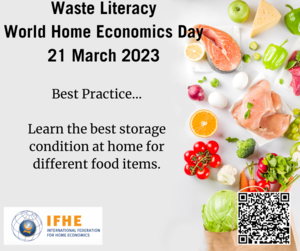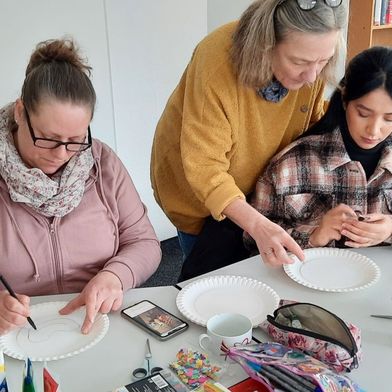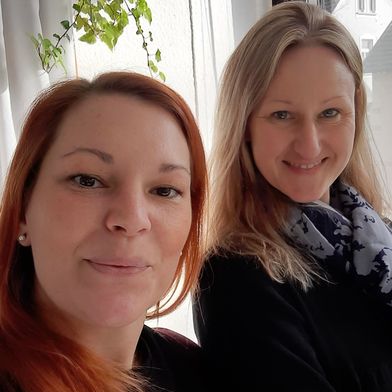Highlighting home economics themes
World Home Economics Day (WHED) was initiated as a public relations event in 1982, and since then each 21 March highlights a home economics theme we feel deserves public attention.
2024: Home Economics 3.0.: A Critical Update
The world’s enormous waste problem won’t be “solved” by just dumping it. We need to come up with better ideas to minimize waste generation and preserve natural resources. Waste Literacy, the knowledge about waste reduction and sustainable consumption, is an essential building block to achieve a sustainable future. Waste Literacy is a central element of education for sustainable development, to which home economics makes a fundamental contribution..
Whether through solution-based research, education or community outreach, home economics experts impart knowledge on how to responsibly manage resources at household and consumer level. This knowledge plays an important role in changing our everyday behaviour. See the informative position paper of IFHE-Germany on Waste Literacy and the IFHE official announcement for World Home Economics Day 2023.

See the informative position paper of the German Section of IFHE English Version, German Version, read the inspiring Opening Speech given by Prof. Dr. Mee Sok PARK, on 8 August 2023 at the 21st ARAHE Biennial International Congress and watch the Video from IFHE President Gwendolyn Hustvedt, introducing the WHED Theme 2024 here.
TECHES:Technology Education for Careers for Home Economics Students Workshop. The workshop is intended to provide skills and experiences for attendees to support them with building a web store. The activities showcasing advanced technologies have been selected to help participants launch, display, and sell their products. Find more information and a workshop agenda here and feel free to use it for creating your own workshop.
Celebrating Word Home Economics Day 2024:
Webinar 21 March 2024, 10 am ('Nigeria): Home Econonmics: The Solution to the Present Socio-Economic and Digital Technology Challenges. More
Webinar 21 March 2024, 2 pm (Ireland): Introducing AI in Food Education on World Home Economics Day.More
Online Event on 21 March 2024 (Austria): Future Technologys and AI in Food Production. Press Release in German Language. More
Lots of Learning and (quite) a bit of fun. Colleagues in Malta celebrate Wordl Home Economics Day on 21 March 2024, 3 - 5 pm. More
Professional Online Event: IFHE US celebrates World Home Economics Day on 23 March 2024, 12 pm (Central Time US). More
2023: Waste Literacy
The world’s enormous waste problem won’t be “solved” by just dumping it. We need to come up with better ideas to minimize waste generation and preserve natural resources. Waste Literacy, the knowledge about waste reduction and sustainable consumption, is an essential building block to achieve a sustainable future. Waste Literacy is a central element of education for sustainable development, to which home economics makes a fundamental contribution..
Whether through solution-based research, education or community outreach, home economics experts impart knowledge on how to responsibly manage resources at household and consumer level. This knowledge plays an important role in changing our everyday behaviour. See the informative position paper of IFHE-Germany on Waste Literacy and the IFHE official announcement for World Home Economics Day 2023.
We also invite you to participate in the Reduce Reuse Regenerate workshop at 21 March at 11am Irish time.
2022: Building resilient homes & families

Pamela Turner, webinar expert
Homes are the most important haven & asset in peoples’ lives. More and more, global developments such as climate change, pandemic and war affect the wellbeing of household members. This year's World Home Economics Day (WHED) focus is on our profession’s contribution to make homes safer and more resilient.
IFHE and many home economics association worldwide celebrate WHED with special events. Here, we highlight two of them:
Webinar series on housing
Housing and indoor environment is a home economics discipline spearheading education & research on building resilient households. IFHE housing experts share their expertise on aspects such as environmental health, consumer choice or housing insecure populations (available at the IFHE youtube channel).
National competition
The German IFHE organized a competition and awarded projects related to home economics skills that strengthen the resilience of families and households. Winner was an association which creates jobs in the field of care of the elderly and thus provides respite for households through the support services. Another prize wend to a 23-year-old home economist who developed teaching materials for pupils in the 8th and 9th grades.

© Jana Rohlfing
Teaching material (author)
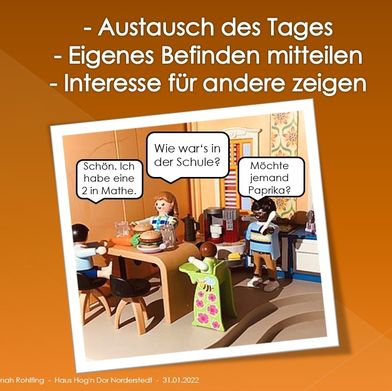
© Jana Rohlfing
teaching material
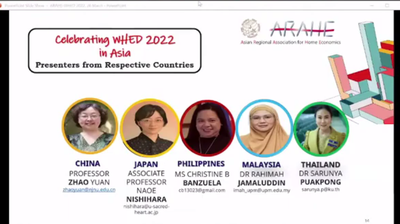
Virtual regional conferences
Member organizations in Asia have been organizing high-level conferences on the occasion of WHED for decades. This was the case again in 2022, when experts from China, Thailand, Japan and Malaysia spoke under the leadership of the Asian Regional Association for Home Economics. Likewise, the Philippine Home Economics Association celebrated with just over 2000 virtual participants (find detailed reports in the Members Area).
More information...
- 2022 webinar series
- Press release: Winners of competition
- Perports, previous themes & free resources (Members Area)
Sitemap
About IFHE
Our Work
Events
© International Federation for Home Economics IFHE

